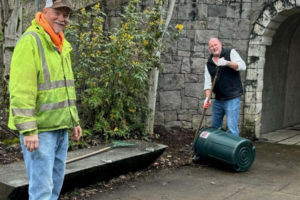Georgia-Pacific reported Tuesday that the company plans to shutdown major portions of its Camas paper mill in the spring of 2018, and cut 280 to 300 jobs — more than two-thirds of its local workforce.
“It’s surprising and not surprising,” Camas Mayor Scott Higgins said on Tuesday afternoon, after the news went public. “The mill has been having less employees for quite some time now. But it’s still shocking and this is a big loss, especially for the employees, for their families.”
The shutdown will affect the plant’s office papers machine, pulp operations and related equipment.
Kristi Ward, Georgia-Pacific’s spokeswoman for the Camas paper mill, said Wednesday that all pulp operations and production of office-related papers will cease next spring, but that it will take much longer for the company to actually deconstruct those portions of the mill.
“Tuesday was about communicating with employees that this is happening,” Ward said. “We don’t have the whole (deconstruction) plan for the next two years yet.”




